- Home
- Alicia Scott
At the Midnight Hour
At the Midnight Hour Read online
At the Midnight Hour
Alicia Scott
To Nancy, for all those long phone calls that showed me the way. Special thanks to Rob Baumgartner for his knowledge of capacitors, and particularly his patience in explaining them again and again and again.
Contents
Prologue
Chapter 1
Chapter 2
Chapter 3
Chapter 4
Chapter 5
Chapter 6
Chapter 7
Chapter 8
Chapter 9
Chapter 10
Chapter 11
Chapter 12
Chapter 13
Chapter 14
Prologue
Thick black clouds teamed against the late-night sky, choking out even the brightest star as they rolled and mushroomed in early-fall fury. Thunder boomed in deep bass rage, but the thick stone walls of the hundred-year-old mansion didn’t even tremble. They’d stood up to storms before. They’d stood the test of time through far, far worse.
With one last gasp, the sky exploded into a downpour. Rain pounded down, until the twisted cypress trees bent beneath the onslaught and appeared to weep their submission. The mansion’s stone walls endured the rain, its windows staring out into the night like the eyes of a condemned man, stoic and unyielding to the last. The walls had been built by Keaton hands and the stories they’d heard had already passed on to legend. The violence they’d seen was already myth.
On these dark nights, no one in the Stamford, Connecticut, community dared look up at the stone house on the hill. No one wanted to see the ivy-choked walls or gnarled towers, especially by the fiery crack of the lightning. No one wanted to know if a light still shone in that one left-hand tower window.
The townspeople whispered that he worked there, slaving all night in the mausoleum comfort of his wealth, as if, in his lab, he could find redemption for his crime. As if, in his lab, high up in the tower, he would no longer hear the sound of his name wrung from her lips as the beautiful blond angel who had been his wife plunged to her death from the opposite tower.
Sitting beside the faint remains of a dying fire, the man in question didn’t even notice the boom of the thunder that was so close the library window trembled. Long ago, he’d learned to block out most things, including the whispers of the people he’d once called friends. He had little use anymore for their opinions, and he had even less use for the anger of the night. It was the darkness within that consumed him.
Absently, he swirled the glass of brandy in his hands. Then he raised the crystal to his lips for one last burning drink.
Five years. Five long years. And suddenly the child was coming home. Alycia’s victory would now be complete.
His face twisted in the dim light, his icy blue eyes harsh and grim. Unable to take it anymore, he rose from the leather chair and began to pace the room with the restlessness of a caged panther.
He hated this house, he thought suddenly. To hell with the fact that he was fourth-generation Keaton and Keatons had always lived in this damn house. To hell with the fact that he’d been raised here all his life, that it was his birthright and his home.
There was nothing homely about this sprawling, overgrown mansion. There were no faint odors of apple pie, no lingering traces of laughter in the halls. Instead, the structure was an overgrown beast, filled with overbearing walnut wood, stifling oil paintings and dark-woven tapestries. Its long halls were choked with the rancid odor of decaying memories, while the vaulted ceilings still rang with the bitter screams of past rage.
And even after all these years, he could still turn a corner in the long, winding corridors and catch the faint scent of her perfume. On the late, late nights, when he was hunched over his computer in his lab, he swore he could still hear the sound of her mocking laughter.
He should have left a long time ago, he thought darkly. Gotten out while he could. But he hadn’t. And, he acknowledged brutally, he never would.
Because somewhere in these dark halls, Alycia’s secrets still lingered. Somewhere in all the twisted staircases and cavernous rooms, the final answer to all his questions lay waiting. The house itself never told its secrets, but perhaps the answers lay buried in the diary he knew she’d kept with such malicious pleasure. So far, however, in all of the sleepless nights of the past five years, he’d never once found any clues to the questions that haunted him.
Alycia would have been proud.
He turned sharply, his face growing dark and the muscle in his jaw clenching with brutal strength.
He didn’t want the child back, he thought harshly. He didn’t want the constant reminder, day in, day out, of Alycia and all her tormenting games. Besides, he was a scientist, the tenth sharpest mind in the country. He didn’t know anything about children. He was a man comfortable only with electrodes, circuitry and computers. He’d taught himself to read when he was just two years old. He’d memorized the phone book one week when he was three. By the age of four, he’d taken apart the TV and put it back together again.
He wasn’t normal. He was the fourth generation in a family known for its money rather than its brains, and he had somehow been born a genius. How they’d stared at him for that, they had grown uncomfortable when he’d entered the room.
But they had needed him for his genius later. The plane crash that had abruptly killed his parents when he was just sixteen years old had left a huge estate to manage, complex finances to untangle. Richard was the only one who could do it. After all, he had already been taking care of most of the business matters since he’d turned fourteen. Surely he could take care of everything, and his younger brother, Blaine, as well.
Still, there had been whispers, whispers that had gone on for as long as he could remember: “That kid’s not right.” “He’s just not normal.”
They were right, he thought darkly. He wasn’t normal, had never been normal.
Just ask Alycia.
He tried to remember now, maybe because he’d had two glasses of brandy, what he’d seen in her in the beginning. It had been seven years ago that they’d met. Seven long years ago.
She had been the blond angel, debuting on the Connecticut social scene. She’d had delicate, porcelain features, with long flaxen hair and the bluest eyes. Even her laugh had been light and musical, so much so that she’d seemed almost not of this world. When she stepped into a room, conversations would die, and men and women alike would stare. She’d been that beautiful.
The minute he’d seen her, he’d wanted her. For three months, he’d virtually forsaken his work. For three months, he’d recited poetry to her and delivered roses. He had pursued her with all the buried passion of a recluse’s lonely heart.
He’d won in the end. With his family’s name and immense fortune, the Wynstons had been only too happy to pair him up with their only daughter. They had even been willing to overlook his dark features and formidable build, as well as his unnatural abilities.
That had been then.
What had Alycia’s parents called him at the funeral? Devil’s spawn. Lucifer’s own. They’d hustled Andrew away as soon as the services ended, not wanting the child to be contaminated even one minute more by his father’s menacing presence.
They’d taken the boy, telling Richard they would never let the man who had killed their daughter have their only grandchild, as well. And he’d let them take Andrew, because he’d known the truth.
Mr. Wynston had even managed to look him straight in the eye, pointing one gnarled, bony finger. “You may have gotten away with destroying our Alycia, you...you...beast. But you’ll never have our grandson as well.”
All his life, Richard had only really loved two things. And the first one had destroyed th
em both.
Even now, however, he could remember the faint impressions of the past—the smell of baby powder, tucking the child in at night and reading sweet stories until Andrew’s huge blue eyes fell, heavy with sleep. Playing patty-cake. Playing the silly airplane game to entice him to eat. The late nights, pacing the floorboards back and forth while Andrew screamed in colicky discontent. And finally, at long last, rocking him to peaceful sleep.
Andrew wasn’t a baby anymore, damn it. He was six years old. Richard didn’t know anything about six-year-olds. It wasn’t as if there was any choice in the matter, however. Mr. and Mrs. Wynston had died, each succumbing to a heart attack within two weeks of each other. God knows, on their deathbeds they had probably still cursed his name and found him to blame.
That they had never found enough evidence to have him arrested for their daughter’s murder was probably their last regret. They’d had to settle for a public hanging of his innocence, instead. Now, he had only to appear outside to see the thin-lipped faces and hear the stabbing whispers. “Murderer...killer. They would’ve gotten him if only he wasn’t so rich.”
He whirled sharply, hating the restlessness that ate at his gut.
“Enough,” he roared out loud. He whirled away, grabbed his brandy glass and swallowed the last burning gulp. Then he hurled the one-hundred-fifty-year-old crystal into the fire, and grimaced at the sound of its crashing.
The child was coming home. There was nothing he could do about it. Six-year-old Andrew with his mother’s face, his mother’s hair, his mother’s eyes. In a matter of days, he would be here.
Richard would hire a nanny, and the nanny would watch the child. It would be as simple as that. Richard would still be free to work up in his tower. He could still keep his long hours, still maintain his sleepless nights. He wouldn’t have to see the child, wouldn’t have to be around him at all.
It would be better. For both of them, it would be better.
But then, abruptly, the anger passed, leaving him alone in the cold library with his bleak ice-blue eyes.
After all these years, he wished the walls of his prison could talk. After all these years, he wished he could get on with his life once and for all. But Alycia had died, and in doing so, she had indeed won the vicious game she’d played with him, with everyone. Now he would never know the answer to the doubts that plagued him so. Now he would never know the truth.
Alycia had fallen from the right-hand tower five years ago. Or rather, she’d been pushed. There were no answers to all the questions everyone had—the police had never concluded their investigation, and had let him go due only to the lack of any concrete evidence against him. They had never even tried to find any other suspects, the jealous husband the easiest man to pursue.
So Alycia had died and everyone thought he’d killed her. It was better to just let it all go.
And so he left the cold comfort of the library, walking to the long, curving staircase that led up to his lab in the left-hand tower. Climbing to the turret, he could hear the sound of the pouring rain, beating upon the slate roof. He could hear the sound of the wind, whipping harshly through the twisted branches of the cypress trees.
But even then, inside the dark recesses of his memory, he could swear he heard her last, dying scream.
Chapter 1
Dusk was already falling by the time the lone cab pulled to at the bottom of the hill. In the back seat a woman ran a tired hand through the tousled mess of her long brown hair. She’d been traveling all day, train station to train station, waiting, boarding, waiting. But now she was here, wherever that was.
All at once she could feel the tightness in her stomach, her nerves were knotting themselves into one ferocious ball. She took a deep breath, and forced herself to look out the window.
She had to look up a long way to see it, the house was perched so far up the hill. There it stood, like a lone sentinel, a dark, watchful eye in a deepening night. Huge, gray, cold. She’d never been a weak woman, four older brothers just didn’t allow it. But looking at the house now, she felt the first tremble of genuine fear run along her spine like ice.
She forced herself to take another deep breath. It was too late for second thoughts. The cab had stopped and the driver was already standing in front of her door, holding it open for her.
You wanted a new life, Elizabeth, a little voice inside her whispered. Now here it is.
But looking at the hulking house on the hill, she didn’t feel so eager anymore—she was feeling very scared and very small town. She wasn’t prepared enough, she thought frantically. Classes weren’t enough for all of this, regardless of how good the agency. Her whole life had been lived in one little town, where she’d lived in the same house with four brothers. She’d gone to the local high school, the local college. She had even married her childhood friend and high school sweetheart.
Holding his head on her lap, she watched the blood dripping down. Blood was everywhere...
“That’s thirty-five dollars, ma’am.” The cabdriver’s words interrupted her thoughts. Feeling somewhat numb, she fumbled for the money in her purse, handing it to the man with slightly trembling hands. He accepted it, then swung her single bag out of the trunk.
To tell the truth, he would be more than a little glad to drive away. The house disturbed him, sitting on the hill like that in the faint light. It just didn’t look right. Wasn’t that where the guy who’d bumped off his wife lived? Yeah, that’s right.
The cabbie looked at the silent girl one last time, feeling torn—she really was an innocent-looking thing, and with all that tumbling hair... He scratched his grizzled beard.
“You sure you want to be here?” he asked at last.
It took her a moment to answer. When she did, it was with a tremulous smile that made even his old heart turn.
“Yes, sir,” she replied softly, forcing her chin higher, though her cheeks were pale. “I’m the new nanny.”
He lingered one last moment. She was a pretty girl, and her voice carried that soft Southern lilt that soothed a man’s nerves. Did she know what she was getting herself into? But then, with a last awkward shrug of his big shoulders, he climbed back into his cab. It was none of his business. He shifted the cab into gear and drove away.
Alone now, Elizabeth Guiness looked through the iron gates to the stone-carved mansion on the hill. With a resolute squaring of her shoulders, she picked up her bag and trudged forward. It was time for new beginnings.
She pressed the buzzer on the small intercom next to the gate. There was a brief pause, then a sharp feminine voice barked, “What?”
Momentarily taken aback, she faltered. “Hello? Hello, my name is Elizabeth Guiness, ma’am,” she began politely. “I’m the new nanny.”
There was a long pause. Then, silently in the darkness, the thick wrought-iron gate slowly rolled back. She hesitated for a moment, but it clearly seemed to be intended as a welcome. So setting her slight uneasiness aside, she raised one foot and planted it squarely forward onto the overgrown driveway that snaked out in front of her. Nothing happened, so, gripping her bags more firmly, she continued forward. Behind her, the gates slid quietly shut.
She kept her eyes resolutely on the house looming ahead. It was almost completely dark now; she could only see the faint outline of a huge main structure with twin towers, and behind them, two long sprawling extensions of the original structure. It was huge, and impressive on the hill. Unfortunately, it also reminded her of a mausoleum.
And it looked very, very dark.
Only two lights offered a dim welcome. There was one downstairs—probably a main room—and one high up in the left tower. Everything else was completely black. She hesitated for a moment, coming to a stop on the driveway. Maybe she’d arrived too late in the evening? Perhaps it would be better to go to some hotel for the night, then present herself first thing in the morning. Unsure now, she turned around to glance back down the hill. The darkness had closed in completely, obliterating the gate an
d swallowing the rest of the path. In spite of herself, she shivered in the cooling night. No, going back down definitely didn’t look too appealing. She would just have to continue.
Adjusting her grip on the bag, she began walking once more. She could just make out the shapes of twisted trees growing on the periphery of the circle of the driveway. Long thin branches extended in front of the dim light of the bottom window. The branches looked like hands clutching at the sky....
She shook away the notion immediately, but not before her uneasiness grew tenfold.
Finally, she came to the top of the small circular driveway. She set down her luggage briefly, taking a moment to wipe the palms of her hands on her overcoat. One more deep breath to steady the nerves. One last hand through her hair, and a brief smoothing of her deep blue skirt. Then, angling her chin in determination, she lifted the heavy brass knocker and let it fall upon the thick wood.
In the distance she could hear the sound echoing through the entranceway. Echoing?
The door cracked open.
“You’re the new nanny?” the same sharp voice from the intercom rang out. This time, however, Elizabeth could see that the voice belonged to a stout, graying maid in a starched black uniform. Her pinched face, peering from around the door, matched her voice.
“Yes,” Liz replied, trying to sound as friendly as possible. She stuck out her hand, hoping the other woman wouldn’t notice the quiver. “Elizabeth Guiness, pleased to meet you.”
But the other woman only frowned at her through narrowed eyes. “Matilda Pram,” she said abruptly, her voice flat with the Northern curtness Liz was still becoming accustomed to. “I’m the head housekeeper.” Mrs. Pram added extra emphasis to the last two words, clearly defining her high status. Liz nodded, her hand dropping unanswered to her side. Feeling her nervousness grow, she attempted a small, open smile.
It also went unreturned.
Definitely uncomfortable now, she had no other option but to proceed. So, picking up her bag, she stepped inside. The heels of her brown boots rang out clearly on the hardwood floors as she advanced to the middle of the room, bag clutched tightly in her hands. The room was immense, the vaulted ceiling rising high above her, while on either side of her broad staircases swept up to the second floor balconies. Dim light scattered from the drooping crystals of a poorly lit chandelier. It threw the walls into deep shadows haunted by the dark outlines of a huge oil painting.

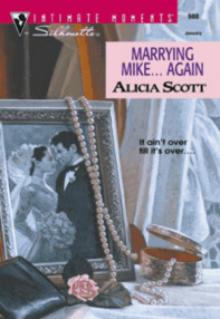 Marrying Mike...Again
Marrying Mike...Again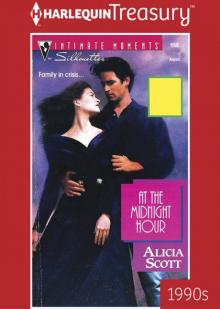 At the Midnight Hour
At the Midnight Hour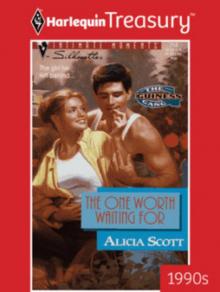 The One Worth Waiting For
The One Worth Waiting For Hiding Jessica
Hiding Jessica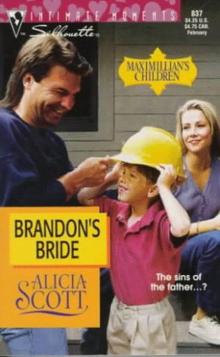 Brandon's Bride
Brandon's Bride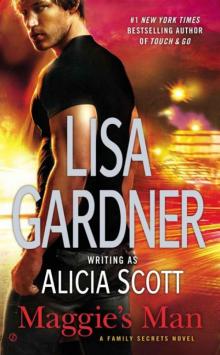 Maggie's Man: A Family Secrets
Maggie's Man: A Family Secrets Macnamara's Woman
Macnamara's Woman Partners in Crime
Partners in Crime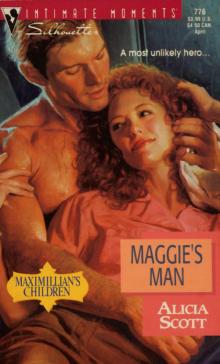 Maggie's Man
Maggie's Man